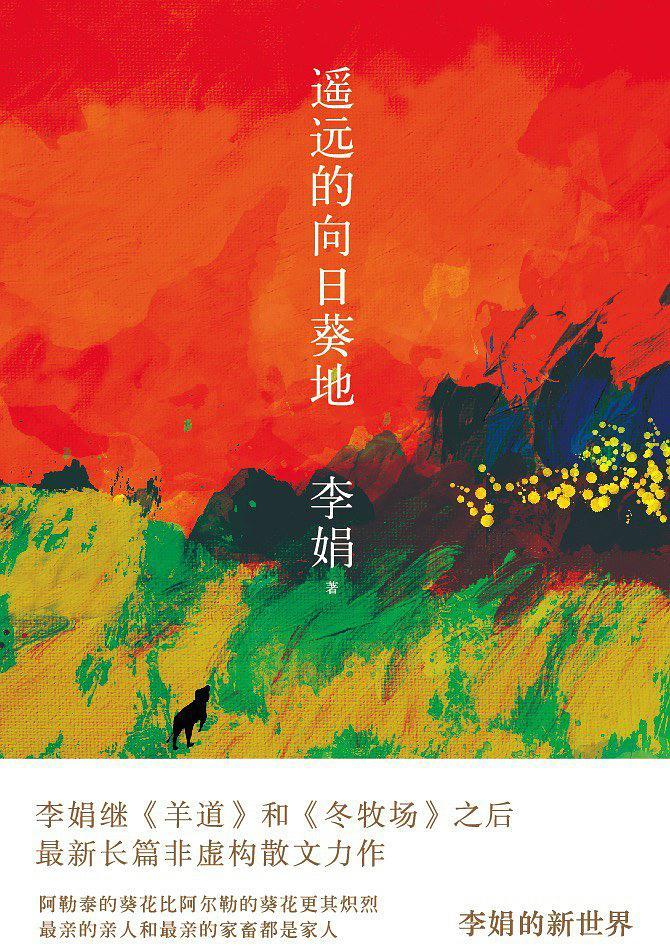My encounter with this book was an inadvertent encounter when I was taking my child to a bookstore, and the bright and rough cover and poetic title attracted me, and I scrawled through the contents and decided to take her home... I am such a person, uninhibited and free-spirited, and perhaps many of the wonderful and lost in my life are due to my unbridled character of unity of knowledge and action.

This is a loose book, the whole reading down, the biggest and most intuitive feeling for me is that the author's writing is super good, almost every chapter, every page, every sentence must be marked down by me, to say that the sorting out of the golden sentences, I want to copy down the whole book is not excessive!
The award speech of the Lu Xun Literature Prize commented: Li Juan's prose has an optimistic and open-minded nomadic spirit. Her writing is unique, transparent and witty, and frontier life is full of dancing vitality and poetry under her pen.
Yes, I have always felt that prose writers are very delicate people, and the grass and trees around her, one person and one thing, are so flexible in her pen, let people follow the emotions she wants to express, or laugh, or cry.
While reading and thinking, I made a lot of reading notes~
Tough and sensual mothers, ill-fated grandmothers, ugly and tiger races with very different personalities, chickens, ducks, rabbits, cats, etc. raised by mothers, these images have become vivid and vivid one by one in the author's pen.
Of course, in addition to feeling the sadness and joy brought by the author's description of people and things, in the author's deeper emotional expression, I feel the author's helplessness for human beings to plunder nature, the small sorrow of human beings in front of nature, and the author's love and awe for nature...
If the author's people and things can bring me a sense of joy and admiration, then the author's emotions for human beings and nature in thinking can resonate with the author's worries and yearning, and suddenly feel that if we read the author's thoughts carefully, our pattern will rise to a higher level.
At the end of the reading, we will feel that the author's ending is blunt and abrupt, and we can't help but wonder: Is this the end? Fortunately, the author explains it in the Afterword.
The author said: "The process of writing is like the process of excavation, even the process of exploration. In the process of "exploration", the author desperately wants to dig up his own memory and express his lyricism, but in the end, the author finds that the life described by these words has never really ended, and the author's nostalgia and expectation for life, as well as the reverence and yearning for nature, have not really stopped...
At the end of the book, the author attaches several photos with text descriptions, carefully looks at each photo, and will recall the scene in the previous book in his mind, and can't help but feel sour and sigh: such a bitter day, such an admirable mother, such a nostalgic grandmother, and so many touching freeze-frame moments in life... They have become the most memorable pictures in the hearts of the author and as a reader! Life has never stopped, feelings have not been put down, they constitute the author's life, but also let me be moved...
Gently close the book, the end of a book, but it is a period of emotional roots, meaning difficult to flat ~ meaning difficult peace.
【Excerpt from the golden sentence】:
1, the so-called "hope", that is, to make an effort may be a little better than to give up completely.
2, the most powerful force of the earth is not the earthquake, but the growth of all things...
3. In the wilderness, such a little bit of vitality gathered by a narrow canal is not lost in the grand scenery of all the great rivers, lakes and oceans in the world.
4, the strongest hope in the world is the "first hope", right?
5, the earth will never change. Fertile forests should not be cut down and destroyed, and barren and dry land should not be forcibly reclaimed or greened. The fate of man is diametrically opposed to the fate of nature.
6. Watching the little bits of life grow up, and then watching them wither a little bit, is the pain that cultivators have shared for thousands of years.
7) I think Grandma ultimately died not from pain and aging, but from waiting.
8, almost every mother has her own specialty dish, almost every child's nostalgia for the mother has the content of food.
9) Sleep is the second greatest thing on Earth. The first huge is quiet.
10, the power of the hands can not change the world, but it can just maintain the life of the individual. Just enough to produce grain from the earth, food to be born from the stove.
11, the huge past and the future are all tied up by a mobile phone. No wonder I'm so vulnerable.
12. What is the difference between planting sunflowers in the wilderness and digging stones in the wilderness? It's all plunder. Plunder with excavators, plunder with plenty of fertilizer. Clutching the sponge of the earth tightly, blackmailing the last drop of liquid.
13 The gold of the wheat field gives a deep soothing power. That's the power of food.
14) Everything in the world that is associated with the emotion of fidelity is aggressive. Either roses or dates.
15, waiting is a plant rooted in loneliness, right? The stronger the loneliness, the more lush the waiting.
16, human beings can even develop soilless cultivation technology, but still can not change the rules of life growth. This rule is also the will of the earth.